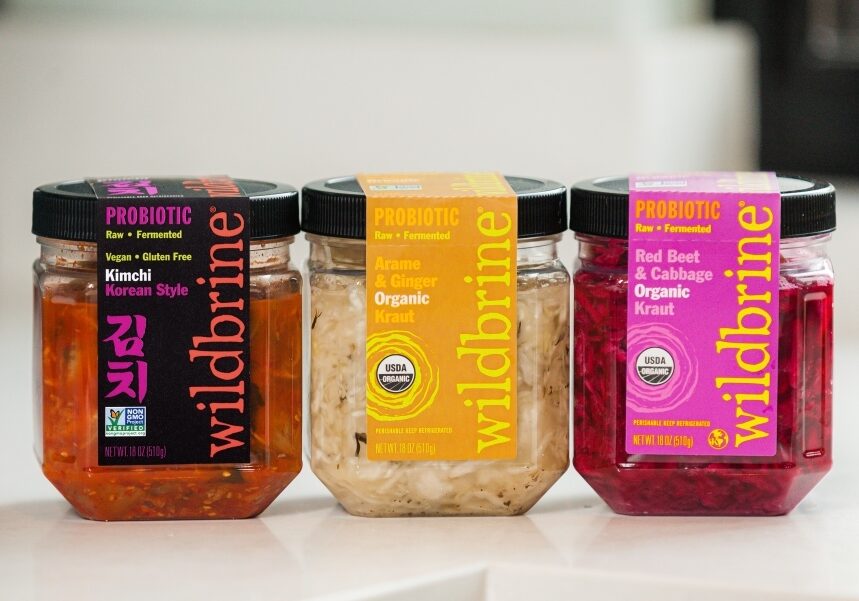When you’re in a good mood, it may be because your microbiome—the collection of about 40 trillion microorganisms that lives in your intestines—is happy. This raises some questions that have fascinating answers. First, what makes your microbiome happy? The answer is that it is well-fed on pro- and pre-biotic rich foods that boost your mood, stimulating its diversity and thus strengthening its ecosystem. Like any natural system of interdependent creatures, the microbiome functions best when it’s most biologically diverse; that is, the bacteria, archaea, fungi, yeast, bacteriophages, parasites, and RNA viruses form an ecosystem where each organism impacts the others and is impacted in return.
Second, a microbiome is like a second brain. It’s linked through the vagus nerve from the gut to the brain. When the microbiome is healthy and happy, it lets our brains know, and our brains in turn boost our mood. Scientists originally thought that our brains were doing most of the communicating, but recent research shows that the microbiome does a lot of the talking.
In fact, the microbiome creates the majority of the body’s neurotransmitters, such as serotonin. Serotonin helps regulate your mood naturally. When your serotonin levels are normal, you feel happier, calmer, more focused, less anxious, and more emotionally stable.
What Are Foods That Boost Your Mood?
The health of the microbiome is directly influenced by the foods we eat. The best sources of nutrients for a healthy microbiome are foods high in fiber. The strictly human part of our digestive system can’t break down much of this fiber, but the living microbiome can. It not only digests and feeds us the nutritional goodies in high-fiber foods, it also uses that fiber to strengthen its own ecosystem.
So what are these high-fiber foods that the microbiome uses to boost our mood? Here’s a list of major sources of plant fiber: almonds, apples, artichokes, bananas, beans, blueberries, broccoli, chickpeas, garden peas, lentils, pistachios, raspberries, and whole grains. Consider these foods “prebiotics,” or foods that feed the microbiome.
There is another category of foods that contribute mightily to the health and happiness of the microbiome, and therefore to a sunny disposition in those who consume them: fermented foods. That’s where we at wildbrine come in, providing you with a wide range of fermented products that supply “probiotics,” or the very microorganisms that constitute the participants in the internal ecology of the microbiome.
When fermented foods are pre-digested by healthful microbes, several positive transformations occur. First, the fermented foods’ taste is incredibly enhanced. Raw cabbage is very nice as cole slaw, but its taste can’t compare to the lip-smacking tribute to the genus Brassica that is well-made sauerkraut, or the fiery Korean-style version called kimchi. In addition, we make fermented red and green salsas and srirachas, plus a line of plant-based butter alternatives and dips, all of which seed your microbiome with the organisms that complete its ecological health.
The probiotics in fermented foods not only pre-digest plant foods to make pickles, sauerkraut, and kimchi, they also metabolize our raw or cooked foods as they enter our intestines, producing valuable compounds that prevent disease and keep our immune system strong.
And a word about kefir, a cultured milk product that contains over 30 microbes that are part of a healthy microbiome. It is one more food that boosts your mood, whose probiotic goodness supports those 40 trillion little guys who put a spring in your step and a song in your heart. They are so important to our health that we couldn’t get along without them. Besides brightening our mood, the microbiome has been shown to affect our pain tolerance, cognitive performance, behavior, and mental health.
Bottom line: Eat lots of varieties of fruits and vegetables and spice up your diet with wildbrine fermented foods. We carry within us a conglomeration of microorganisms that depend on us for good health. And when they are happy and healthy, so are we.
About the Author: Sonoma County resident Jeff Cox is the author of 24 books, including The Essential Book of Fermentation (Avery, 2013)
